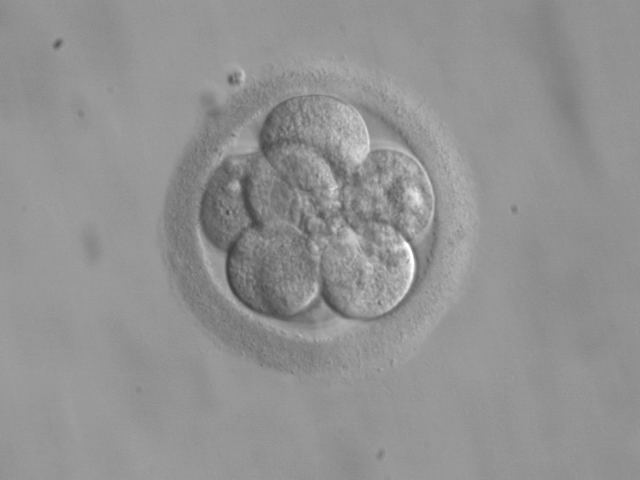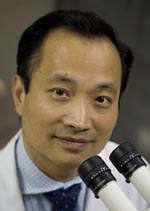
After suffering a painful condition starting at age 12, this college student made her choice.
Egg-freezing is rising in popularity, and it’s become even buzzier lately thanks to celebrities like Bachelorette star Kaitlyn Bristowe and Olivia Munn opening up about their experience with the procedure. Some employers–notably, Apple and Facebook–have even added egg-freezing to their benefits package. But this isn’t a new thing for Morgan Bartley, 19: She first froze her eggs at age 15–and she did it again four years later.
As a young teenager, Bartley suffered from two rounds of ovarian torsion, a painful condition in which a woman’s ovaries twist, and her first experience with the condition was when she was just 12. “I didn’t really know what was going on–I didn’t even know what an ovary was,” she tells SELF. She says the torsion was “very, very painful…kind of like menstrual cramps, but you can actually feel your organ twisting” and she ended up in the ER, where a doctor saw a mass in an ultrasound. “He used the word ‘tumor,’ and being 12, I associated the word with cancer and thought it meant I was going to die,” she says.
Months later, Morgan experienced the torsion again. Her right ovary was removed and she underwent emergency surgery to untwist her left ovary, as well as shorten the ligaments that made that ovary prone to torsion.
When she was 13, Bartley’s left ovary twisted again, causing it to stop working normally.
After the corrective surgery, doctors didn’t think it was possible for the torsion to recur. Since it was initially undetected, the torsion caused more damage than the previous rounds. During surgery, her doctor decided to untwist the ovary in order to try to preserve her ability to have kids in the future, but it didn’t look promising. “It looked like it was completely dead at the time, but the surgeon had hope that it would come back to life,” Bartley says.
As a result of the damage, she says she developed premature ovarian failure, a condition in which a woman’s ovaries stop working normally before age 40, in her freshman year of high school. The condition causes menopause-like symptoms. “It was pretty interesting to be ingratiating myself into high school, but at the same time going through hot flashes, cold sweats, and mood swings–all these things that you can’t explain to kids,” she says.
Infertility is common with premature ovarian failure, per the Mayo Clinic, and Bartley realized she might not be able to have her own biological children one day. “As a young girl, I envisioned growing up, getting married, and having kids,” she says. “To know that wasn’t going to be possible for me was probably the darkest time in my life.” Bartley ended up falling into a depression. “I felt very, very isolated and different from the kids my age,” she says.
At the same time, her doctor was carefully monitoring her ovary for signs of life, administering routine blood tests and ultrasounds, but things didn’t look promising. Then, after about nine months, one of her tests showed that she had some ovarian function. A CAT scan revealed that Bartley’s ovary was much smaller than a normal ovary, and it had moved behind her uterus and tacked itself in place by scar tissue from the torsion surgery–but it was working.
Bartley’s doctor brought up egg-freezing as an option, but it ran the risk of another ovarian torsion.
At the time, the American Society of Reproductive Medicine had just removed the “experimental” label from egg-freezing, saying that there were enough data to allow them to deem that the procedure is safe for women with infertility issues, those undergoing cancer treatment, or those with other medical conditions that might affect future fertility. After her doctor mentioned the possibility of egg-freezing, Bartley was referred to reproductive endocrinologist Wendy Chang, M.D., F.A.C.O.G., at Southern California Reproductive Center.
Quick aside about egg-freezing as an experimental procedure: When the ASRM removed the “experimental” label, that only applied to people using egg-freezing as a procedure for women with fertility problems or conditions that could impact their future fertility–like Bartley’s ovarian torsion. That said, experts maintain the position that there isn’t enough data to support egg-freezing as a recommendation for women with healthy fertility–those who may see it as an insurance policy just in case. Also worth noting that egg-freezing isn’t a sure thing, regardless of who’s getting it done. The success rate depends on a variety of factors, including how old you are when you have your eggs frozen.
Chang tells SELF that it was a “big deal” that Bartley came to her office in her mid-teens, noting that she couldn’t find any research on patients undergoing egg-freezing that young. Chang and her colleagues put Bartley’s case up to their ethics committee, a group of psychologists, attorneys, physicians, and nurses, to make sure they “weren’t going overboard,” she says. The egg-freezing process puts a woman at risk of having an ovarian torsion, and given Bartley’s history, Chang was worried that she would suffer from one again. “We were asking ourselves if we would re-create the problem by trying to save some eggs,” she says.
In addition, Bartley’s remaining ovary is still working and, as of now, it’s possible that she could conceive without reproductive assistance, Chang says. But, after having conversations with Bartley, her parents, and her gynecologist, Chang and her team decided to go through with the procedure.
“After thinking that I was never going to be able to have my own children, it was like a new lease on life,” Bartley says. She understood the risks but says it was a “no-brainer” to go ahead with it. Bartley ended up getting a grant from the Baby Quest Foundation, which helps people afford fertility treatments.
Chang was able to harvest and freeze 10 healthy eggs. However, Chang says that having 20 healthy eggs is ideal for increasing the odds that Bartley could have two children in the future.
But Bartley wasn’t able to receive another grant and couldn’t afford the procedure on her own. “After that ended, it was like a crash,” she says. She fell into a “deep and dark depression,” developed problems with binge-eating, and ended up gaining 70 pounds in one year. “By the time I turned 17, I was almost 300 pounds,” she says. “My health wasn’t up to par–it was another barrier that was keeping me from another round.”
Because of her age, Bartley is in uncharted territory, but says the experience already changed her life in a positive way.
When she turned 18, Bartley underwent a vertical sleeve gastrectomy, a procedure in which doctors removed 80 percent of her stomach. Then, with the help of the surgery, as well as lifestyle and dietary changes, she lost 115 pounds. She began sharing her story on Instagram and built up a following–she has 125,000 followers to date.
The Doctors heard about her story and had her on the show, along with Chang–and announced that they would be covering a second round of egg-freezing for her. Bartley underwent the egg-freezing process again this March and was able to freeze nine more eggs. “It’s such good news,” she says. “I wasn’t expecting that.” Bartley may never need to use those eggs, as Chang says that her chances of conceiving a child without reproductive assistance are “excellent” given that her ovary is still functional.
That said, Bartley says her doctors have made it clear that she’s in uncharted territory, and they expected her to go through menopause in high school. “There aren’t any medical journals or cases to compare to because of my young age,” she says. “But because of the state of my ovary and all the trauma that it went through, they definitely think that it’s on borrowed time.”
Bartley says she’s grateful that egg-freezing was possible for her, calling it a “backup plan.” “This is a peace of mind for me,” she says. “I’m convinced that my life is now very different than it would have been if egg-freezing hadn’t been an option.”
